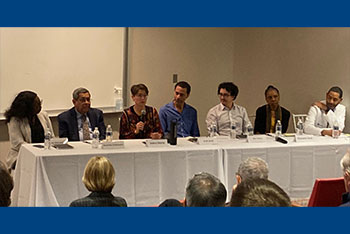
On March 19th, Andrea T. Deyrup, MD, PhD, participated in a panel discussion following a presentation on “Using Race, Ethnicity, and Ancestry as Population Descriptors in Genetics and Genomics Research.” It was hosted by Duke’s Precision Genomics Collaboratory and Trinity College of Arts and Sciences, and led by Duke professor Charmaine Royal, PhD, and New York University professor Aravinda Chakravarti, PhD, co-chairs of the 2023 National Academics of Sciences, Engineering, and Medicine (NASEM) Report. The report emphasized the importance of ensuring that genetics research benefits all groups in society and mitigates harm.

“It was an incredible opportunity to bring together leaders in this discipline to address how these recommendations can be implemented and how the challenges to disseminating this report beyond the basic sciences into clinical research and medicine can be overcome," said Deyrup.
For decades, genetics and genomics researchers have used race, ethnicity, ancestry, and other population descriptors in research. This has opened powerful areas of study of human history and evolution, biology, diseases, and heritable traits. However, these descriptors are slippery words with hard-to-pin-down meanings. They’re also contested words, and the use of “race” as a surrogate for biology or genetics has led to confusion, discrimination, and increased race-based health inequities.
A national committee co-chaired by Duke Professor Charmaine Royal issued a report that emphasized the high stakes of ensuring that genetics research benefits all groups in society and mitigates harm. Read more in Duke Today’s article, “Rethinking the Use of Race and Other Labels in Genetics Research.”